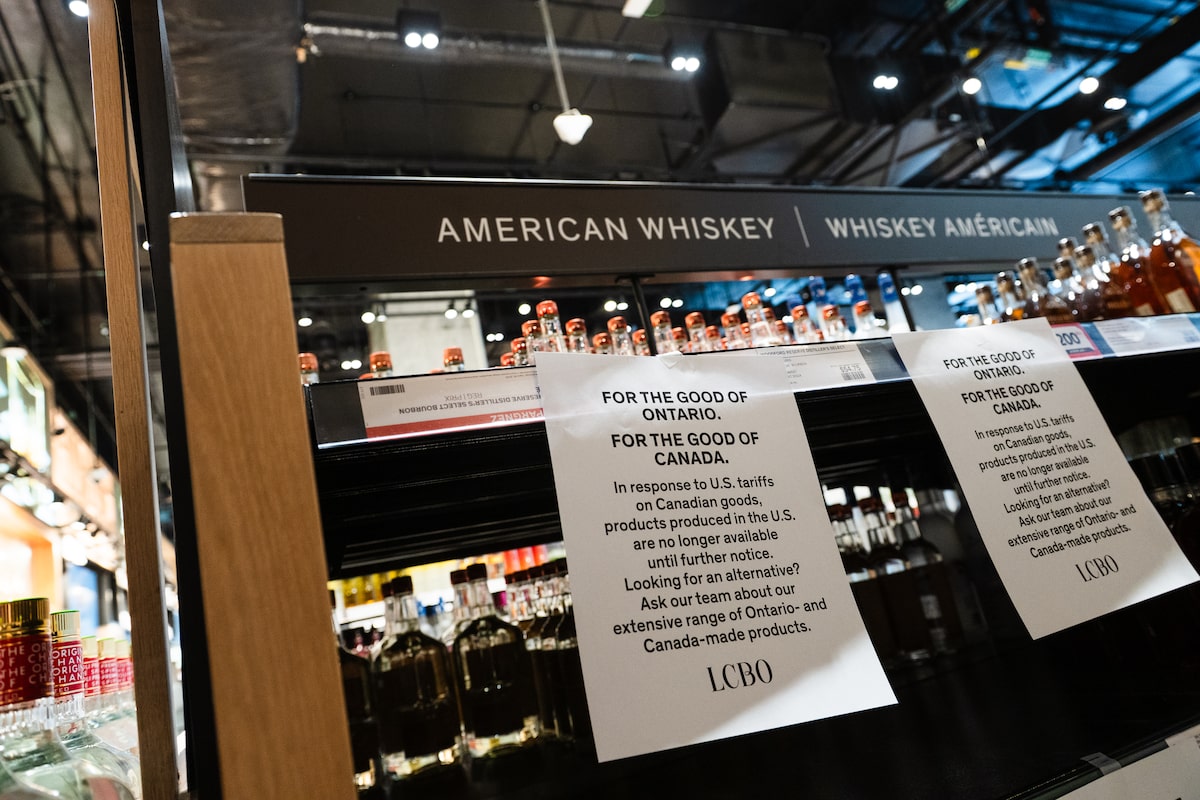A half-empty shelf of American whiskey is pictured at the 100 Queen’s Quay East LCBO in Toronto on March 4, 2025. Ontario Premier Doug Ford says the LCBO will not be putting U.S. liquor back on shelves until Canada and the U.S. reach a trade deal.Laura Proctor/The Canadian Press
Prime Minister Mark Carney’s recent decision to lift countertariffs on U.S. goods has renewed questions about whether more Canadian provinces will allow liquor retailers to put U.S. alcohol back on their shelves.
U.S. industry associations have been calling for an end to U.S. booze bans, arguing that they harm Canadian consumers and businesses.
But outside of Alberta and Saskatchewan, which lifted moratoriums on buying and selling U.S. liquor in June, governments across Canada are showing no sign of budging.
Ontario Premier Doug Ford said on Wednesday the LCBO − Canada’s largest vendor of alcohol − will not be putting U.S. liquor back on shelves until U.S. tariffs are dropped, or the two countries reach a trade deal that replaces the current United States-Mexico-Canada Agreement, or USMCA.
Ontario ban on U.S. booze to remain until new trade deal reached, Ford says
“It’s still going to be banned until they cut the tariffs, or we make a deal with them,” Mr. Ford told reporters. “It’s not coming on our shelves.”
Premiers across the country ordered regional control boards to stop selling U.S. alcohol in February when U.S. President Donald Trump imposed a 25-per-cent tariff on most goods from Canada.
Ontario, Quebec, Nova Scotia, Manitoba, Newfoundland and Labrador, and Prince Edward Island have no plans to return U.S. alcohol to shelves, and aren’t selling existing stock, according to officials from provincial governments and liquor control boards.
Quebec Finance Minister Eric Girard announced last week that the province, which has an estimated $27-million in U.S.-made alcohol in storage, will donate some products that are set to expire soon.
In British Columbia, New Brunswick and Yukon, retailers are allowed to sell inventory they obtained before the bans came into effect in March. However, spokespeople for all three liquor boards said they aren’t purchasing more liquor from the U.S.
U.S. wine and spirits off the menu long-term for majority of Canadian drinkers: report
Spokespeople the Northwest Territories said the province sold its entire American alcohol supply and won’t be buying more American product for the time being. Nunavut also stopped ordering alcohol from the U.S., according to a Global News report.
Like other jurisdictions, Alberta stopped accepting alcohol shipments from the U.S. and removed existing stock from sale to retailers in early March. Officials revised the directive on March 18 to permit the province-run wholesaler to offload its existing stock. On June 6, Alberta decided to resume business-as-usual, buying and selling U.S. alcohol products. Saskatchewan followed suit the following week.
Brandon Aboultaif, spokesperson for Service Alberta and Red Tape Reduction, said the decision was intended to signal Alberta’s “renewed commitment” to fair trade.
“Alberta has always advocated for a reasonable and proportionate response to U.S. tariffs, and we will continue to advance solutions that protect Alberta’s economy while supporting a fair and mutually beneficial trading relationship,” he said.
The refusal of governments in most provinces to lift the bans is placing an “unnecessary burden” on Canadian consumers and businesses, according to Chris Swonger, president of the U.S. Distilled Spirits Council, who called this week for U.S. spirits to return to Canadian shelves.
Canada is the largest importer of U.S. wine and the second most important export market for U.S.-made spirits, buying $221-million worth of U.S. spirits last year, according to Mr. Swonger’s statement.
Quebec liquor board prepares to destroy $300,000 worth of U.S. alcohol banned from stores
Sales for Canadian products are up, according to several liquor boards. Domestic wine sales rose 65 per cent in Ontario and 58 per cent in Quebec from last year. Home-grown whiskey sales spiked in Alberta and Atlantic Canada during the ban compared with last year’s numbers.
But taking U.S. products off shelves hasn’t benefited all Canadian businesses in the liquor industry. Importers that represent U.S. producers are feeling strained.
Harris Davidson, who owns a wine import and distribution business in Ontario, said wines from California vineyards represent 50 per cent of his business. Since the ban on U.S. booze came into effect in March, Mr. Davidson has had to lay off or reduce hours for 20 per cent of his 25 staff and give up a commercial real estate lease.
If the ban remains in place, he said it will be “impossible” to continue running his business “without even more drastic layoffs.”
Mr. Davidson said he supports an “elbows up” approach but believes consumers should be left to choose whether they want to buy Canadian.
He is urging Mr. Ford to follow what he sees as Mr. Carney’s lead by lifting Ontario’s U.S. booze ban.
“We need to get to serious talks between Canada and the United States, and this alcohol ban is standing in the way from that team Canada approach,” he said.
With a report from Jeff Gray
